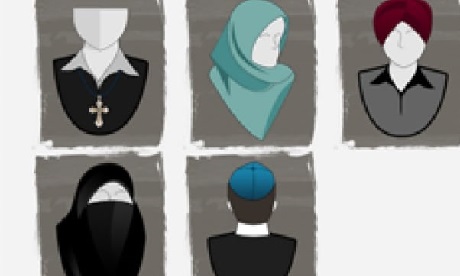A secularism bill currently before the Quebec government aims to ensure the religious neutrality of the state.
The preamble to Bill 21, entitled “An Act respecting the laicity of the State,” explains the Coalition Avenir Québec (CAQ) government’s motivation.
It says the Quebec nation “has its own characteristics, one of which is its civil law tradition, distinct social values and a specific history that [has] led it to develop a particular attachment to state laicity.”
Secularity should be “affirmed in a manner that ensures a balance between the collective rights of the Quebec nation and human rights and freedom.”
The preamble also notes Quebec “attaches importance to the equality of women and men”.
The bill says laicity is based on four principles:
- The separation of state and religions
- The religious neutrality of the state
- The equality of all citizens and freedom of conscience
- Freedom of religion.
If it becomes law, public workers in positions of authority would be banned from wearing religious symbols.
The CAQ Minister of Immigration says all religious symbols regardless of size would be prohibited. However, religious tattoos or Rastafarian dreadlocks did not count as religious symbols.
The bill would directly affect:
- Public employees who carry weapons, including: police officers, courthouse constables, bodyguards, prison guards and wildlife officers
- Crown prosecutors, government lawyers and judges
- School principals, vice-principals and teachers.
The bill includes a clause exempting those already wearing religious symbols from removing them as long as they hold the same job.
In addition, the bill proposes rules for citizens who apply for public services: they will have to uncover their faces for identification or security purposes. This could affect people using public transit cards on municipal services.
Other citizens who will be directly impacted include doctors, dentists and midwives in public institutions, subsidised daycare workers and school boards.
The previous Liberal government passed a law with similar requirements, but the relevant sections remain suspended following a court challenge by civil liberties groups.
The CAQ is getting around this by invoking a so-called “notwithstanding clause”.
Officially called Section 33 of the Charter of Rights and Freedoms, the clause allows provincial or federal authorities to override certain sections of the charter for a period of five years.
The CAQ also introduced a motion promising to move the crucifix hanging in the National Assembly’s main chamber to a different part of the building. The motion passed unanimously.
The crucifix has been hanging above the Speaker’s chair since 1936.
A government-commissioned report into secularism and identity issues recommended in 2008 that it be removed, but no government has done so.
Source
